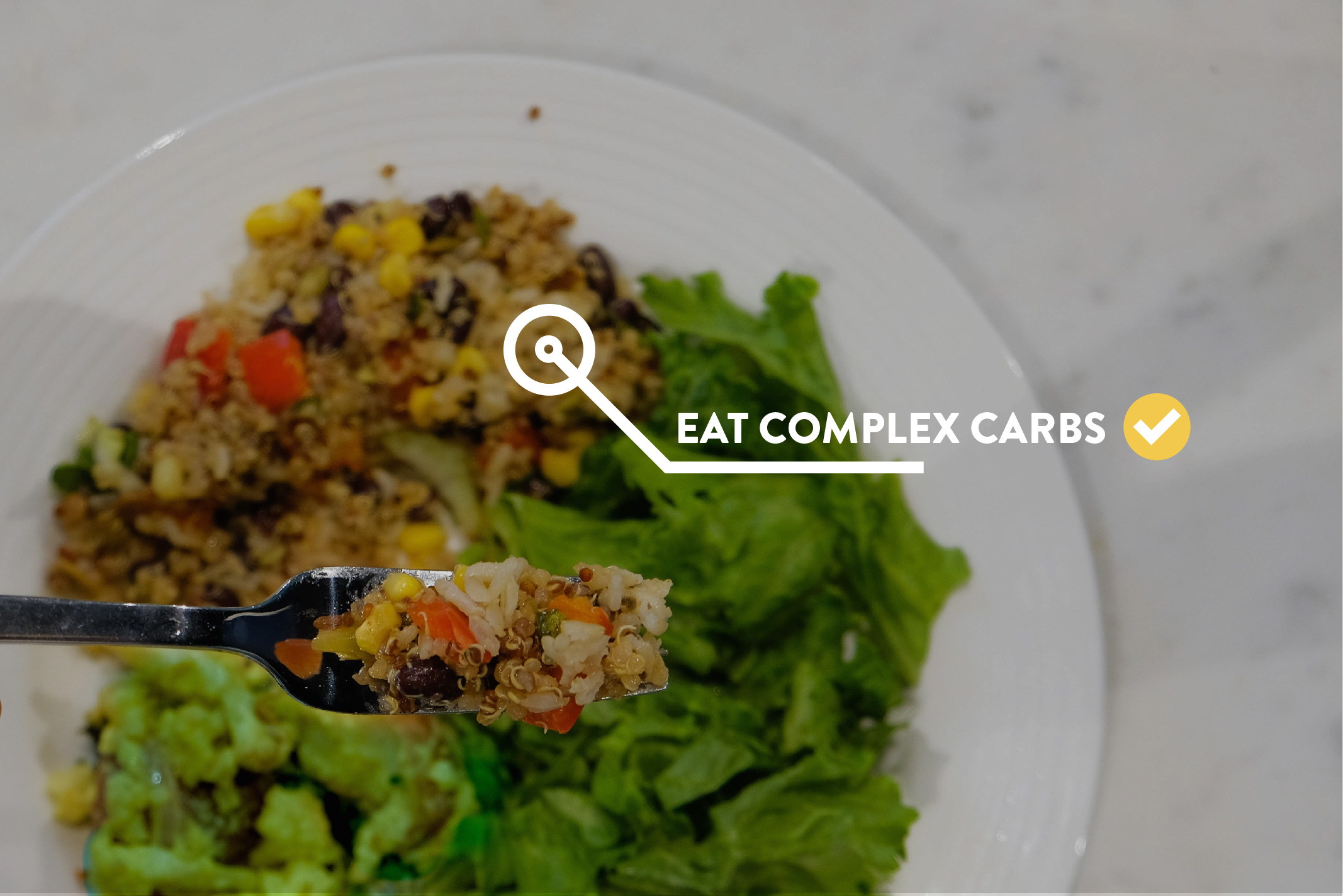Carbohydrates (A.K.A carbs) have gotten a bad reputation in a lot of fitness circles. But there are three different kinds of carbs—sugars, starches, and fiber. If we were to label any of the carbs as bad, it’d be the building block unit of all carbs: sugar. It’s important to not let one bad apple ruin the whole bunch.
Not just complex carbohydrates are complex
Carbohydrates fall into one of two camps, simple or complex. Simple carbs are comprised of one or two sugar units combined together. Complex carbs are built with three or more sugar units linked together in a chain. Starches and fibers are considered complex carbohydrates.
It’s currently suggested by American nutritional guidelines that 45-60% of your caloric intake comes from carbohydrates [1]. How can we sort through the complexity of carbs, and make it simple enough to help our clients meet their daily nutritional carb goals?
Why eat complex carbohydrates rather than simple?
Complex carbs, specifically whole grain starches, have a number of health benefits associated with them. Including complex carbs in one’s diet has been shown to reduce the incidence of cardiovascular disease, Type II diabetes, inflammation, other chronic diseases, and digestive disorders [2].
Often complex carbs come with both long-chain starches for a sustained energy source and fiber. Whole foods that include unrefined carbs tend to also be nutrient-dense and bring a boatload of goodness with them. Nutrients like vitamins, minerals, and antioxidants are usually found in complex carbohydrate-heavy foods.
Simple sugars are simply unhealthy
In contrast to complex carbs, simple sugars (especially refined sugars) tend to be found in foods that are not dense in nutrients. They do very little in the way of fiber content, typically. And perhaps most important to clients who are trying to lose weight and feel healthier, overconsumption of simple sugars can lead to feeling tired, foggy, or depressed. It’ll also be important for those who struggle with blood sugar levels (development of Type II Diabetes), feel hungry after just eating, and have trouble losing weight [3]. Only time simple sugars are useful is during ongoing, high intensity, activity (think: Ironman triathlons or HIIT workouts).
Making it simple for your clients to eat complex carbs
Habit building is one of the best ways to get your client to habitually skip the simple carbs, and simultaneously start increasing their complex carb consumption. To build a new healthy habit, one of the keys is to identify an old habit loop (cue, behavior, reward) and replace the old behavior with a new, more desirable one. Ideally, the cue and even reward would stay the same in the old and new loops. On occasion, you may need to modify the reward to make it pleasurable enough without sabotaging your goal.
Here is an example of a client’s old habit loop:
“When I get bored at home and want to relax (cue), I go to the kitchen and get a bag of candies to eat while watching TV (behavior). This makes me feel good (reward).” Here’s when a trainer may need to step in and add in—“because sweet flavors reward my brain.”
To make this a new habit, simply replace a bag of candies, with a bowl of fruit. The cue is the same, the reward is similar. True, simple sugars have a way bigger kick on our brain’s reward system, but with time, the sweetness in fruit can become rewarding, as our brain’s reward system returns to normal. And yes, fruit has mostly simple carbs, but they do have up to 3g of fiber per serving.4 Similar healthy replacements can be made with anything white flour/refined based, by switching to whole wheat versions (great examples are bread, pasta, and rice).
Using tech to make things easier
The power of habit tracking is well documented. All authors of great habit-based books agree that tracking is one of the essential factors in successfully building good habits [5] [6] [7]. While there are some habit tracking apps, Trainerize empowers you to help your clients (both in-person and online) to build their habits. You can see their progress, and help coach them into pre-featured habits (like eating more complex carbs), or via customizable goals (eating fruit while watching TV).
Eating complex carbs in a nutshell:
- Carbohydrates are categorized into sugars, starches, and fibers.
- Sugars are the simplest and base unit, and when linked together become complex carbs (either digestible starches for energy or indigestible fiber).
- Complex carbohydrates have been shown to decrease chronic diseases (cardiovascular, cancer, and diabetes).
- Habit building through habit tracking, and replacing simple carbs with complex carbs can help your clients succeed.
References:
- https://health.gov/dietaryguidelines/2015/guidelines/introduction/dietary-guidelines-for-americans/
- https://www.medicalnewstoday.com/articles/318615.php
- https://www.precisionnutrition.com/encyclopedia/food/carbohydrates
- https://fdc.nal.usda.gov/fdc-app.html#/?query=ndbNumber:9003
- https://charlesduhigg.com/the-power-of-habit/
- https://jamesclear.com/atomic-habits
- https://gretchenrubin.com/books/better-than-before/about-the-book/

